Key takeaways:
- Housing discrimination is often subtle and can impact individuals based on race, gender, familial status, and more, affecting their sense of belonging.
- Community housing development is vital for creating inclusive, affordable living spaces that foster stability and resilience in neighborhoods.
- The Fair Housing Act and local laws provide crucial legal protections against discrimination, empowering individuals to challenge unfair practices.
- Building supportive networks and advocating for fair housing practices can amplify voices and drive change within communities.
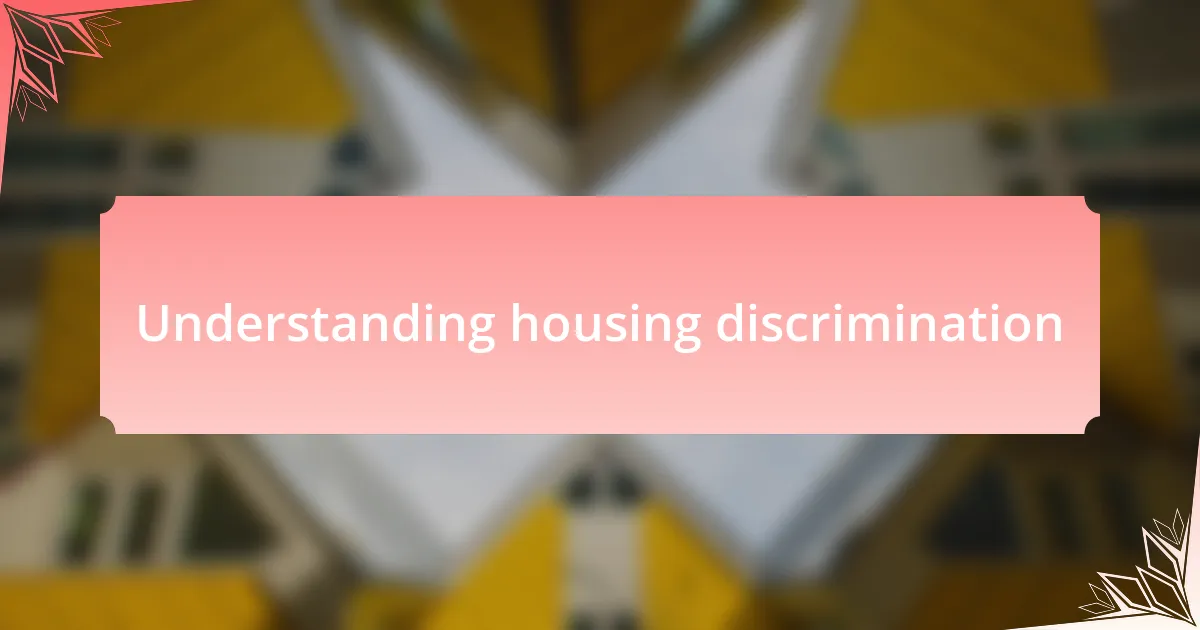
Understanding housing discrimination
Housing discrimination is often subtle, manifesting in ways that can leave individuals feeling powerless. I remember once applying for an apartment and being told it had already been taken—only to find out later that it was still available. How often do we accept these stories without questioning the motives behind them?
It’s essential to recognize that discrimination can stem from various factors, including race, gender, disability, and even familial status. For instance, there was a time when my own application was overlooked because I had children, which led me to wonder how many families face similar roadblocks. These experiences can leave a lasting impact on one’s sense of belonging and trust in the housing system.
Understanding housing discrimination isn’t just about recognizing the laws in place; it’s about listening to the stories of those affected. I’ve had friends who were treated differently simply because of their backgrounds, and their experiences made me realize that the implications reach far beyond just finding a place to live. How can we foster empathy and change if we don’t delve deeper into these lived experiences?
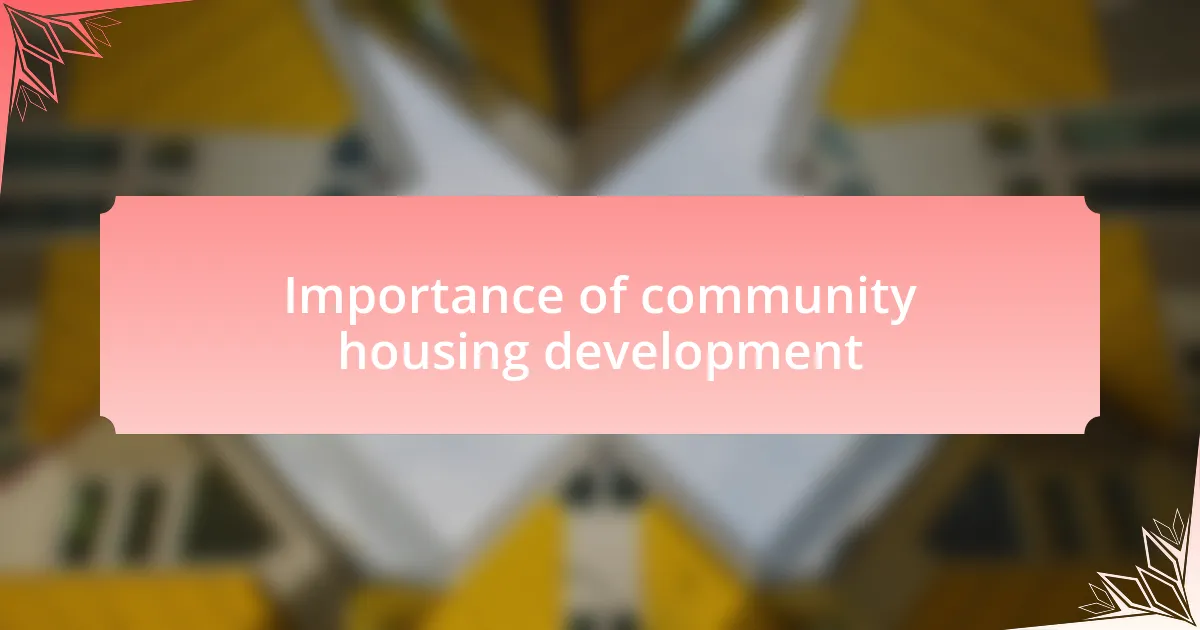
Importance of community housing development
Community housing development plays a crucial role in addressing the inequalities that arise from housing discrimination. I’ve witnessed firsthand how inclusive housing initiatives can transform neighborhoods, creating spaces where everyone feels welcome. Have you ever stepped into a community where diverse backgrounds come together? It’s a powerful experience that fosters unity and understanding.
Moreover, community housing developments often emphasize affordability, allowing low- to moderate-income families access to quality living conditions. I remember when a new affordable housing project opened in my area—it not only provided homes but also sparked a renewed sense of hope among residents. It’s remarkable how secure housing can lead to stability in other areas of life, such as education and employment.
Investing in community housing development is not just a matter of providing shelter; it’s about building resilient communities. Each brick laid is a testament to the belief that everyone deserves a chance at a better life, regardless of their background. So, what are we doing to support these important initiatives, and how can each of us be part of the solution?
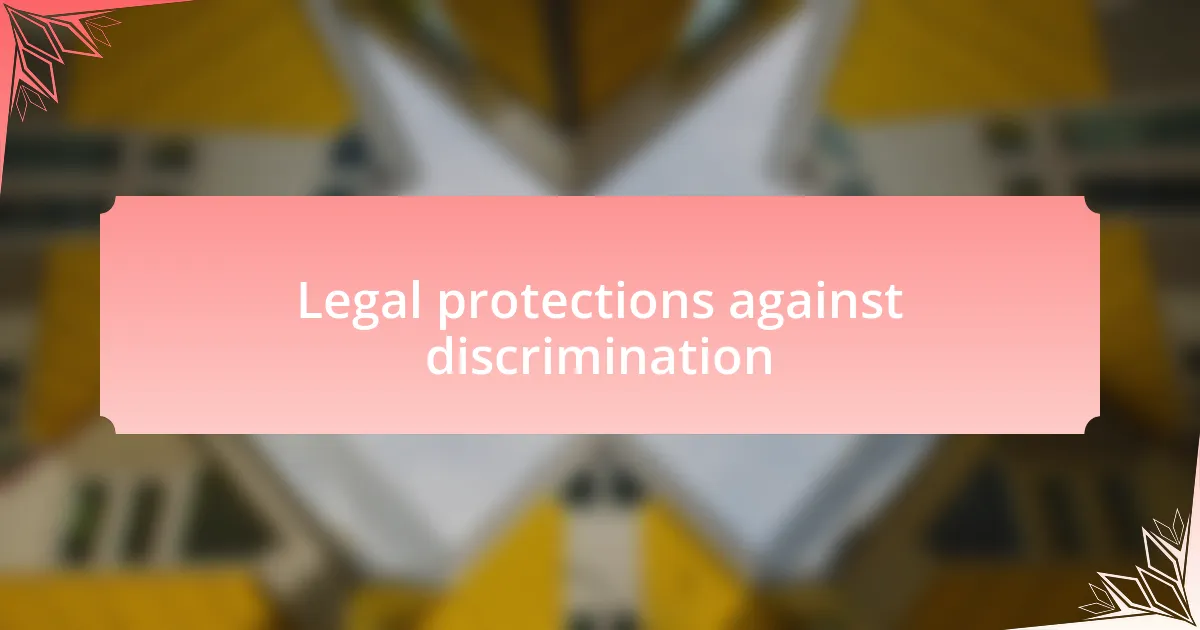
Legal protections against discrimination
When I think about legal protections against discrimination, the Fair Housing Act often comes to mind. This landmark legislation was designed to combat the systemic issues I’ve encountered, ensuring that no one faces discrimination based on race, color, religion, sex, national origin, familial status, or disability. The ability to challenge unfair practices and seek justice can feel empowering, especially when you’ve personally faced housing bias.
Another significant protection comes through local and state laws that enhance what the Fair Housing Act covers. I’ve seen these regulations make a difference in my community, where specific ordinances prevent discrimination based on factors like sexual orientation or source of income. It’s heartening to know that these protections can forge paths toward more equitable living situations, even for those who may feel marginalized.
Moreover, the enforcement mechanisms available under these laws, such as filing complaints with the Department of Housing and Urban Development (HUD), are critical. I’ve observed friends navigate this process, and while it can be daunting, knowing there’s a system in place to support victims of discrimination can be a game-changer. Have you ever wondered how different your experience would be without these legal safeguards? It’s a reminder of why advocating for these rights is so essential.
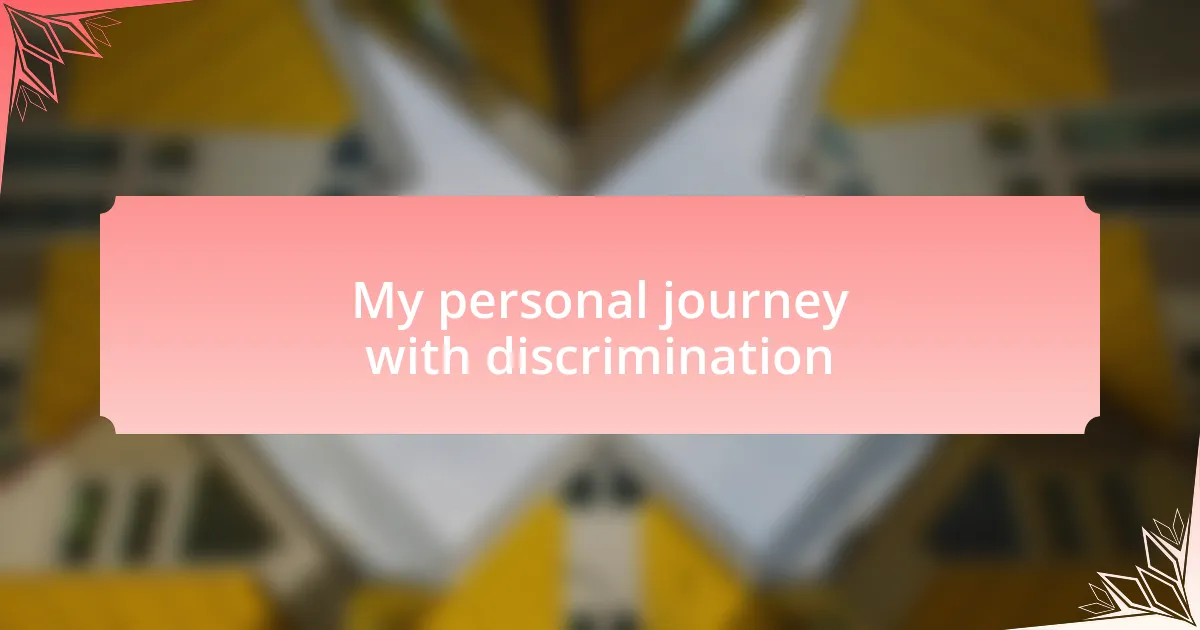
My personal journey with discrimination
My experience with discrimination in housing has been a difficult journey. I still vividly remember the moment I applied for an apartment that seemed perfect for me. When the landlord learned I was a single parent, I could see the change in his demeanor. It was disheartening, especially when I noticed he quickly dismissed my application without reason.
Dealing with rejection was painful, but it also ignited a fire within me to understand my rights. After researching, I discovered my family status was protected under the Fair Housing Act, but that knowledge came too late for my first application. I can’t help but wonder, how many others might feel lost and helpless in a similar situation, unaware that they have legal recourse?
Each subsequent encounter with discrimination left me more determined to share my story. I remember talking to friends who faced similar challenges and the shared frustration we felt was palpable. Together, we began advocating for ourselves and others in our community, fostering a sense of belonging that had once felt so out of reach. Isn’t it remarkable how a collective voice can turn individual experiences into a powerful movement for change?
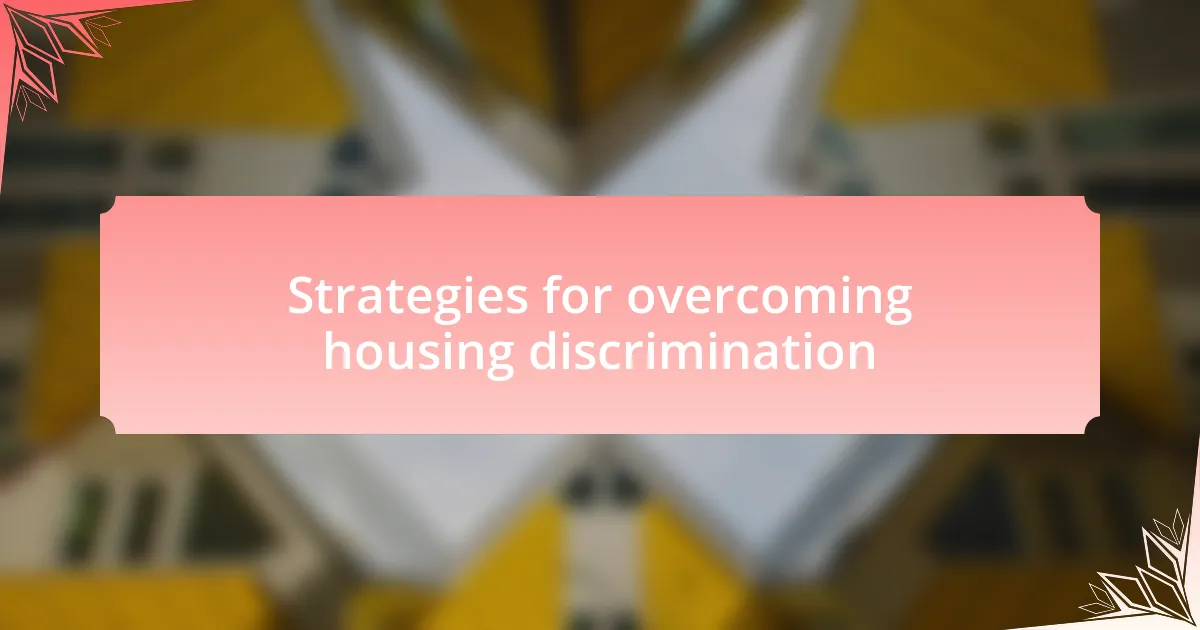
Strategies for overcoming housing discrimination
One effective strategy I found was to connect with local advocacy groups that focus on housing rights. I reached out to a nonprofit organization dedicated to helping individuals like myself navigate the complexities of discrimination. Their support not only equipped me with resources and information but also fostered a network of allies who understood my struggles firsthand. Have you ever shared your experience with others and felt that sense of relief? I certainly did, and it made me feel less alone in this journey.
Educating myself on housing laws was another turning point. I remember pouring over the Fair Housing Act and realizing the protections I had that I was previously unaware of. When I returned to a landlord who had previously turned me away, I felt empowered. Armed with this knowledge, I was ready to stand my ground. Isn’t it amazing how information can transform uncertainty into confidence?
Lastly, I learned the importance of documenting every interaction with potential landlords. Keeping records of emails, messages, and conversations helped me create a clear timeline of events that proved invaluable when I filed complaints. I even found that just the act of being organized gave me assurance and clarity during stressful situations. Have you ever noticed how effective a paper trail can be? In my case, it opened doors I never thought possible.
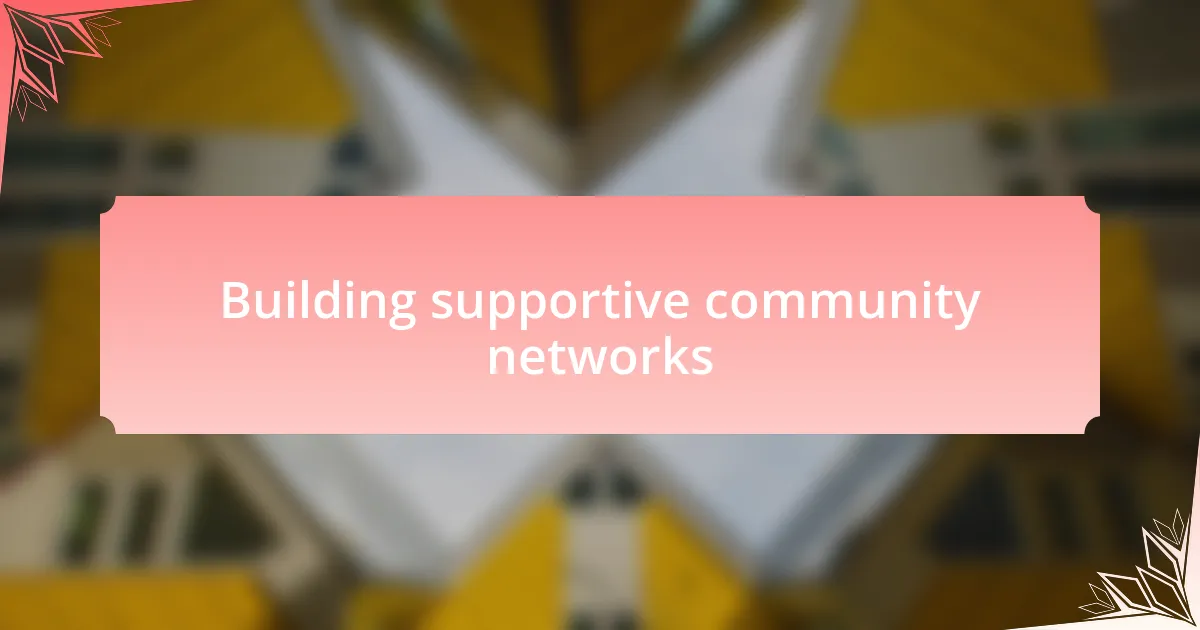
Building supportive community networks
Building supportive community networks has been a game-changer for me. When I joined a local community group, I quickly discovered the power of shared experiences. Each meeting felt like a safe space where I could express my frustrations and hopes, surrounded by people who truly understood what I was going through. Have you ever felt that level of connection with others? It’s incredible how together we worked to amplify our voices and advocate for change.
Additionally, I found that volunteering within the community opened doors and fostered relationships that proved invaluable. I remember engaging in events that raised awareness about housing discrimination, which not only educated participants but also ignited a sense of purpose within me. There’s something about standing shoulder to shoulder with others in a common cause that creates bonds that last. Don’t you think that taking action together makes the journey feel lighter?
Moreover, I learned that building these networks isn’t just about support; it’s also about resources. I met individuals who had faced similar challenges and were eager to share their strategies for success. One friend introduced me to a local housing attorney who provided guidance that I would have never found alone. Isn’t it fascinating how a single conversation can lead to opportunities that change your path? I often reflect on how important it is to cultivate relationships where knowledge and support flow freely.
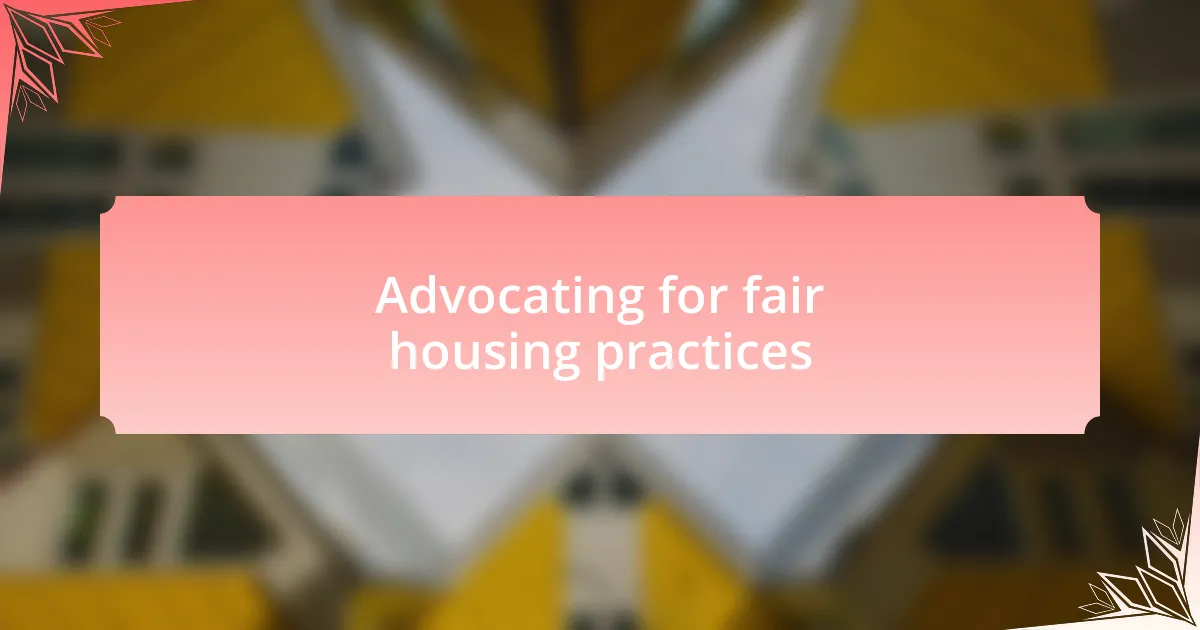
Advocating for fair housing practices
Advocating for fair housing practices requires a commitment to educating ourselves and others. I remember attending a workshop where we learned about our rights and the laws in place to protect us from discrimination. It was empowering to see firsthand how knowledge could transform our understanding of the housing market. Have you ever felt that rush of empowerment when you realize your voice matters? It’s a crucial step in fostering change.
The power of storytelling can’t be overlooked in our advocacy efforts. I took part in a community forum where residents shared their experiences with housing discrimination. Listening to their stories moved me deeply; each shared narrative added depth to the issue and revealed the real-life impact of unfair practices. This experience reinforced the idea that our voices, when shared collectively, can spark critical conversations and inspire action for justice. Don’t you think real stories resonate more effectively than statistics alone?
I also found that engaging with local lawmakers was a pivotal part of my advocacy. A few of us organized a meeting with our city council to discuss fair housing initiatives, and I vividly recall the mix of anxiety and excitement as we prepared our points. Speaking about our experiences made the issue feel tangible for them, and I left that meeting feeling hopeful. Isn’t it incredible how taking the initiative to speak up can create pathways for dialogue that lead to real change? Each step we take in advocating for fair housing practices not only changes policies but also cultivates a more just community.